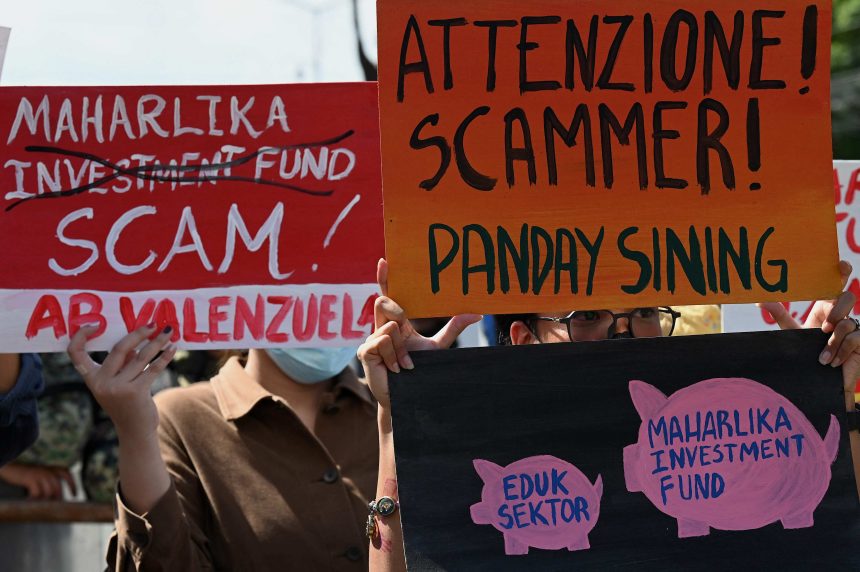Enterprising Filipinos have wasted no time in appropriating the Marcos name and image for get-rich schemes implying links to Philippine President Ferdinand Marcos Jnr’s planned controversial Maharlika sovereign wealth fund. The schemes uncovered by This Week in Asia on social media platforms Facebook and YouTube involve joiners paying a registration fee or processing fee for an identification card to obtain the promised money. The Securities and Exchange Commission recently warned the public against dealing with a corporation named Bagong Bansang Maharlika International Inc (BBMII), which references the president’s nickname BBM, or Bongbong Marcos, uses his picture alongside that of BBMII’s national director, Jovelyn Tibuasan, and appropriates the brand name of the Maharlika Investment Fund. It comes as Marcos Jnr pledged to launch the US$8.9 billion Maharlika fund by the end of this year and dismissed reports that it had been suspended. Philippines’ Maharlika fund to be rolled out by year’s end, Marcos Jnr says On its Facebook page, BBMII initially claimed the aid money would come partly from the wealth amassed by the late president Ferdinand Marcos Snr “for the future of the nation”, and contrary to news reports, the dictator did not die in Hawaii in 1989 but was still alive to this day. It later changed its story and claimed “a foreigner with a clean heart” was its generous donor. The SEC said on August 24 that while BBMII’s registration as a corporation was approved on March 18 last year, it had not obtained a licence to solicit funds, give these away to the needy and undertake other social welfare activities. On October 10, Tibuasan posted a video on Facebook threatening to file criminal charges against an unnamed person who had called her a “scammer”. She pointed out in her video that her organisation was SEC-registered. What she did not say, though, was on the same day, three BBMII “volunteers” were arrested inside the National Bureau of Investigation (NBI) compound in Batangas City, south of Manila. Christopher Hernandez, the NBI chief attorney there, had told GMA Network that on October 10, the three were “brazenly” inside NBI’s compound handing out application forms for BBMII membership at 100 pesos (US$1.78) each, in exchange for free livelihood, aid, education, hospitalisation and “food security”. The NBI, which is the investigative arm of the Department of Justice, then conducted a sting operation using marked money and rounded up the trio. Upon further scrutiny, Hernandez said BBMII turned out to have no accreditation from the Department of Social Welfare and Development (DSWD) to engage in social welfare activities. He described the organisation as “bogus” and said the three people who had been arrested would be charged with attempted estafa, or criminal deception. Philippines’ first sovereign fund will be ‘run by professionals’: Marcos Jnr This Week in Asia has reached out to Tibuasan for an interview, but she did not reply. In videos posted on BBMII’s Facebook page, which has 55,100 members, and her personal page, she denied being “a scammer” and claimed she was about to be accredited with the DSWD and was waiting to have an audience with Marcos Jnr. She assured members that the group would be giving sick members financial aid of up to 5,000 pesos (US$89) each “once the entire Philippines is willing and ready to receive such aid from us”. Despite the SEC’s warning, BBMII continues to recruit new members and hand out aid. BBMII’s Facebook page also runs several private chat groups via Facebook Messenger. This Week in Asia observed that in some of these chat groups, members were repeatedly encouraged to go to another Facebook page of a certain Natalie Anna Peter, a “professional” cryptocurrency, bitcoin and forex trader from Houston, Texas, now allegedly based in Manila. Peter’s page contains alleged testimonials from Filipinos gushing over the huge sums of money they had received after engaging her services through GCash, a local app that functions as a mobile wallet for sending and receiving money. Another Facebook group called “Beneficiaries of R.A. No. 11954 Maharlika Investment Fund Act of 2023” promises members – for a membership fee of 100 pesos – a share of the “Maharlika” gold, which it claimed only Marcos Jnr had the power to unlock from the central banks of China, Japan, Russia and the United States. It claimed the money had been lent by Marcos Snr decades ago to these countries during their financial crises. When This Week in Asia asked the group for an interview, its administrator called the “Custodian of Resources Advocacy, Inc” blocked This Week in Asia’s access to its page. A third group called “Maharlika Nation” maintains at least five Facebook and YouTube pages. It offers a “bank book” to its own International Bank of Maharlika (IBM) located on Bucas Grande island in Surigao del Norte, southern Philippines. Through IBM, “Maharlika Nation” issues its currency notes called the Golden Zion (G-Zion). It has declared support for Marcos Jnr and encourages Filipinos working in Hong Kong and elsewhere to join because “we will try to ensure that you will no longer need to go abroad”. Philippine critics slam sovereign fund: ‘our children will be buried in debt’ In 2020, Bangko Sentral ng Pilipinas had already issued a warning that the G-Zion was fake money and only the central bank could issue legal tender. This was after hundreds had flocked to Bucas Grande island to join as members after paying a 3,000 pesos (US$53) joining fee. The members were then issued G-Zion paper notes and a bank passbook, and were told that one G-Zion could be exchanged for 200 pesos (US$3.50), the moment major banks recognised the currency. This Week in Asia has reached out to Gliceria Daquis Lao-ay of “Maharlika Nation” – who claims to work in Hong Kong – but received no reply. The Philippine National Police Anti-Cybercrime Group has also been contacted but did not reply by press time. That President Marcos Jnr’s Maharlika Fund has attracted such schemes did not surprise Gideon Lasco, a Filipino anthropologist, who is also a medical doctor. He told This Week in Asia: “The socioeconomic conditions of the people targeted by these scams comprise an important context to their effectiveness. At the same time, pre-existing beliefs about the Marcoses’ wealth make any association with them a powerful hook.” Philippines must ‘speedily’ probe Duterte’s threat to ‘kill’ lawmaker, group urges Lasco recalled that years before Marcos Jnr became president, “tens of thousands of people went to Los Baños [in Laguna province, southeast of Manila] on the strength of a promised share of Marcos’ wealth – an episode that shows how deep-seated these [get-rich-quick] hopes have become”. “The fact that the people behind these scams are seldom held accountable for their crimes encourages them [and others] to continue,” Lasco said. The Maharlika name, though popular with the administration, has had a chequered history. Marcos Jnr’s late father claimed to have led a World War II guerrilla unit that he had named Maharlika and tried to get the US army to recognise it, to no avail. Marcos Jnr’s Maharlika fund has been described as “a scam” by former Bayan Muna party list congressman Teodoro Casiño because it promised such high immediate returns on investment, although the money would be invested in long-term infrastructure projects. The Department of Finance has said that Maharlika’s expected return is about 8.6 per cent on average. House Ways and Means Committee chair Congressman Joey Salceda claimed in December last year that some in the Philippine business community suspected the fund would be a conduit for laundering wealth plundered by the Marcoses, which Marcos Jnr has denied. The government to this day has yet to recover from the Marcos family funds of reportedly at least US$10 billion. Dominic Ligot, a data security and privacy advocate who founded Data Ethics PH, pointed out the alarming ease with which Filipinos gave up their private information and biometrics to groups like BBMII. “Any personally identifiable information, coupled with biometrics such as picture or even thumbprints and blood type whether voluntarily given or illegally obtained, can be used for nefarious purposes,” he told This Week in Asia. Philippines’ ‘embarrassing’ abstention from UN’s Gaza resolution sparks protest “Sensitive biometric information such as blood type may [lead to] possible fraud in the healthcare sector, and some government IDs such as drivers’ licences that include blood type as an identifier, are easier to fake with this information,” Ligot added. He called attention to the fact that the police had recently seized 80,000 registered but unused SIM cards, some of which contained forged identities of notable personalities such as GMA broadcaster Jessica Soho. “Identity theft and forgery are the most likely risks, as these details can be used to manufacture identities and documents that can then be used for other activities such as financial crime and blackmail,” Ligot said.



